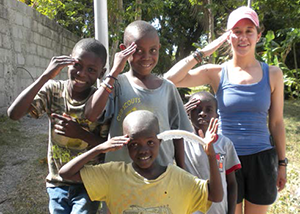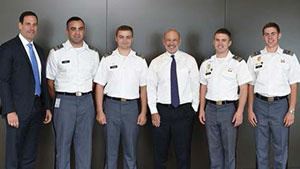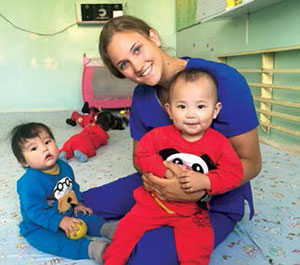Academy Scholars Program
Brings Curriculum to Life
 Cadet Carolyn Kehn ’18 teaches a proper salute to children at an orphanage in Haiti. Cadet Carolyn Kehn ’18 teaches a proper salute to children at an orphanage in Haiti. |
During the summer, Cadet Meyer Ungerman ’16 worked at the Boeing Company with the engineering team involved in nano satellite production. Among his responsibilities were researching nano satellites currently in production, in orbit, or out of use, compiling information on other entities that produce nano satellites, and ultimately delivering a paper and presentation on potential partnerships for the Boeing Company within this field. Ungerman notes that in addition to furthering his studies in mechanical engineering, the experience helped him, “understand the civilian side of military contracting and procurement. It also taught me various ways to manage a team of highly skilled individuals, which will serve me well as an officer.”
Cadet Ungerman was one of more than 1,000 cadets who participated in an out-of-classroom work or research opportunity this past summer, as part of the Academy Scholars Program — a priority funding need for the Academy within the For Us All Campaign. This program offers experiential learning opportunities, often referred to as AIADs (Academic Individual Advanced Development), that enhance cadets’ education and leadership development. These experiences include internships at government agencies and corporations as well as cultural immersion opportunities abroad through which cadets train with foreign militaries or work with non-governmental organizations.
“The Academy Scholars Program is a high priority for the Academy,” says Brigadier General Timothy Trainor ’83, Dean of the Academic Board. “We can’t just teach cadets theories and concepts. We need to bring the curriculum to life and have cadets actually use those concepts out in the real world. That’s where you get real growth and learning.”
 Cadets Corry Daoust ’16, Madison Hager ’16, John Sabert ’16, and Michael St. Denis ’16 met with Gary Giglio ’89 and Goldman Sachs Chairman & CEO Lloyd Blankfein while working at Goldman Sachs. Cadets Corry Daoust ’16, Madison Hager ’16, John Sabert ’16, and Michael St. Denis ’16 met with Gary Giglio ’89 and Goldman Sachs Chairman & CEO Lloyd Blankfein while working at Goldman Sachs. |
In 2015, approximately 720 cadets took part in domestic internships in 36 different states while 320 cadets traveled abroad to 40 different countries as part of a cultural immersion experience. Cadets Corry Daoust ’16, Madison Hager ’16, John Sabert ’16, and Michael St. Denis ’16 worked at Goldman Sachs, where they worked with a wide range of teams to develop financial models and investment presentations and gain firsthand experience in the world of investment banking. Cadet Hager worked as an analyst on the Technology, Media, and Telecom Team. “I worked extensively on a financing deal in which a technology start-up sought to raise additional capital,” explains Hager. “In order to facilitate this transaction, I worked with my team to model the company’s profitability based on future earnings projections and establish a value for the company.” He was ultimately able to accompany the team on a trip to Boston to meet with the start-up. “Being involved in the background work and seeing this deal first-hand gave me a much greater understanding of the structure of investment banking and taught me important lessons about finance and life,” says Hager. “The experience will help me understand how the various components of my major apply to the real-world, and I will implement the team-based leadership styles I learned at Goldman Sachs as an officer in a deployed scenario.”
 Cadet Abby Toth ’16, above, worked at a clinical care center in Mongolia, caring for children aged six months to four years. Cadet Abby Toth ’16, above, worked at a clinical care center in Mongolia, caring for children aged six months to four years. |
Many other cadets pursued trips far from the world of investment banking and in fact far from the settings and cultures they may be used to. Cadet Abby Toth ’16 worked in Ulaanbaatar, the capital of Mongolia, with the non- governmental organization Projects Abroad to assist a community health center and orphanage. “I worked with fifteen toddlers aged two to four,” says Toth. “I evaluated their developmental progress using Project Abroad’s care management program, organized activities for them, and helped with meals.” The experience impacted Toth on many levels, fostering stronger and often non-verbal communication skills, greater cultural awareness, and more independence and confidence. “Living by myself with a host family, I learned how to integrate into the Mongolian culture, how to be more perceptive, and how to show my feelings and intentions without words. As an Army officer, I will experience diversity both on the battlefield and within my own platoon. Therefore, it is important to understand different cultures.”
Whether abroad or within the U.S., these opportunities have been met with much success among cadets. Last year, more than 90 percent of participating cadets said they would recommend their experience to another cadet and the vast majority reported intellectual development beyond their academic major. Additionally, these experiences provide benefit to the organizations and companies for which cadets work.
As a result the program’s widespread impact and popularity, the Academy aims to increase the number and variety of out- of-classroom experiences and provide every cadet with at least one of these opportunities over the course of his or her four years. In order to accomplish this goal, the Academy must rely on private funding, particularly in light of recent reductions in appropriated funding. Funding reductions were most severely experienced in 2013 during sequestration, which caused cadet participation to drop to less than 800 that year. Donations from graduates, families, and friends, which made up approximately 50 percent of the program’s funding this year, offset these funding gaps and provide greater stability to the overall program and its long-term goals.
“Private funding has been critical to sustaining the Academy Scholars Program and increasing the number of cadet experiences amidst challenging and unpredictable budgetary times,” explains Trainor. “In order to provide our cadets with the work experience, cultural exposure, and leadership development they need to succeed as leaders, we must continue to grow this program and enhance cadets’ experiences.” ACADEMY SCHOLARS PROGRAM